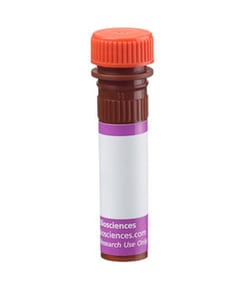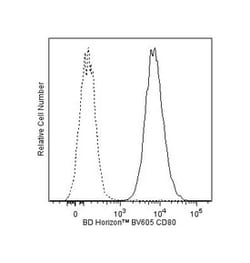Learn More
CD80 Mouse anti-Human, Brilliant Violet 605, Clone: L307.4, BD
Mouse Monoclonal Antibody
Supplier: BD Biosciences 563315
Description
The L307 monoclonal antibody specifically binds to B7/BB1, a 60 kDa transmembrane glycoprotein that was clustered as CD80 in the Fifth International Workshop on Human Leukocyte Differentiation Antigens. CD80, a member of the Ig supergene family, is expressed on activated B cells, T cells, macrophages, and dendritic cells. It is the ligand for two molecules expressed on T cells, CD28 and CD152 (CTLA-4). CD80 is also expressed on activated CD4-positive and CD8-positive T cells, appearing late after activation suggesting that activated T cells may be capable of autocrine costimulation via the CD28 activation pathway. The binding of CD28 by anti-CD28 or by CD80 results in T-cell activation and a signal for IL-2 production.
This antibody is conjugated to BD Horizon BV605 which is part of the BD Horizon Brilliant™ Violet family of dyes. With an Ex Max of 407-nm and Em Max of 602-nm, BD Horizon BV605 can be excited by a violet laser and detected with a standard 610/20-nm filter set. BD Horizon BV605 is a tandem fluorochrome of BD Horizon BV421 and an acceptor dye with an Em max at 605-nm. Due to the excitation of the acceptor dye by the green (532 nm) and yellow-green (561 nm) lasers, there will be significant spillover into the PE and BD Horizon PE-CF594 detectors off the green or yellow-green lasers. BD Horizon BV605 conjugates are very bright, often exhibiting brightness equivalent to PE conjugates and can be used as a third color off of the violet laser.

Specifications
| CD80 | |
| Monoclonal | |
| Brilliant Violet 605 | |
| Aqueous buffered solution containing BSA and ≤0.09% sodium azide. | |
| Human B7-transfected L cells | |
| 100 Tests | |
| Primary | |
| Store undiluted at 4°C and protected from prolonged exposure to light. Do not freeze. |
| Flow Cytometry | |
| L307.4 | |
| B7.1; B7-1; Activation B7-1 antigen; B7; BB1; CD28LG; CD28LG1; LAB7; L307 | |
| Mouse | |
| Affinity Purified | |
| RUO | |
| Human | |
| IgG1 κ |
Your input is important to us. Please complete this form to provide feedback related to the content on this product.

